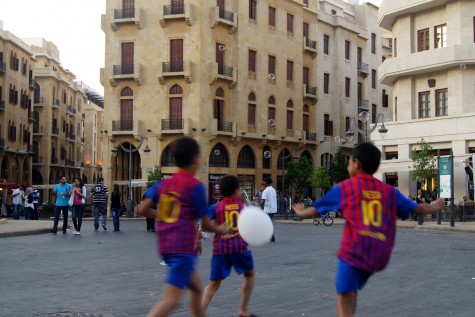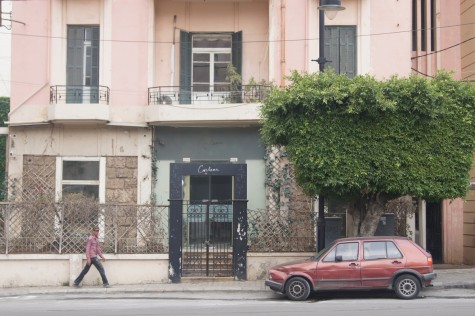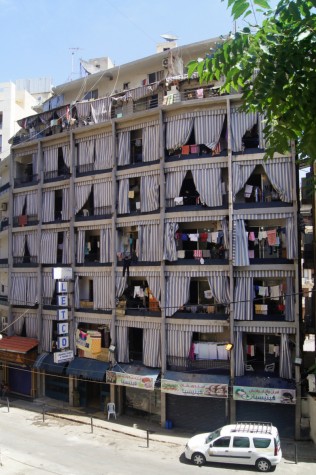After six weeks there, I appear to be the only person who thinks the opposite, and I’ve had a hard time writing this post to say so. (And I like Portland!) I don’t blame Beirut, I don’t think–I blame the hype.
I went to Beirut in 1999, and it was a haphazard mess of terrible infrastructure and jerks in armored Mercedes. According to the papers, though, Beirut’s come a long way, baby!

Guess what? Beirut is still a mess. Ostentatious wealth still rules, and people have to haul water–not like in rural Africa, but anyway, in 5-gallon jugs up stairs because the power is out so the elevator isn’t running.
Added misfortunes since ’99: the internet is some of the slowest (and most expensive) in the world, and crude plastic surgery has become wildly popular among a certain set. (Women look startled, strained, flotational–if you don’t want to feel like you’re having an acid flashback, don’t go anywhere near a mall!)
Sure, it would be a buzzkill to mention these details in a “Beirut nightlife is sizzling hot!” story. But it’s slightly disingenuous to ignore them altogether. All of these things (except the plastic surgery–not sure what that’s about) are indicators of a much more troubling reality, and the simple fact that Beirut is still scarred by war–and so are Beirutis.
This is not a “cool” city mainly because Beirutis do not keep their cool. They are, to generalize wildly, jumpy and aggressive and filled with road rage, and the instant there’s bad news, they retreat to their apartments with a week’s worth of food.

I completely understand why this is, and I would probably be pessimistic and anxious if I lived there too. But as a visitor, you have to be willfully blind to ignore the harsh truth behind the art-book stores, the Gemmayzeh pubs with their reggae-Gypsy-funk-Oriental DJs, and the massive, glittering malls.
That truth is: it takes a long time to get over the trauma of war, and it won’t be happening anytime soon in Lebanon.
Most travel stories nod to the various wars, to heighten the drama of the phoenix-like rise of the capital: “Beirutis, scarred by decades of war…”; “Beirut, once marred by civil war…” etc etc. But the implication is that’s all done–Beirutis are back to boozing and beach-lounging, and it’s all good. The checkered past just gives a little frisson to the decadent present–all the bullet holes add cachet.
But Lebanon’s 1991 Amnesty Law let the perpetrators of civil-war horrors slide back into society, even politics. Lebanon has not signed on to the international Mine Ban Treaty. And any peace in Lebanon is precarious with Syria next door, not to mention Israel–and Hizbullah’s unending “resistance” to it.
I’m not complaining about the poor infrastructure and the bad drivers per se–that I can handle. I have a harder time with partying in the face of obvious psychological trauma. I had a similar reaction to New Orleans after Katrina–a wonderful and interesting place to visit, but it’s wrong to pretend the city is “back” and hopping when a stranger on a streetcorner will, unprompted, in a shaking voice, tell you how he lost his home.

Beirut does actually have all the charms touted in the travel stories. It’s small, so you can crash the “scene” in a week. You’re on the Mediterranean, which is lovely. Women dress in every possible way. (Though cleavage is often deployed in the same aggressive way as the plastic surgery–ow, my eyes!) Its place on the International Hipster Circuit is established thanks to cool bars, good coffee, contemporary art and a visible gay scene.
Beirut is cosmopolitan in a way that most of the rest of the region is not. First-time visitors to the Middle East are usually happy to find the place and people so relatable, which is no small thing.
What do you think? Is it dishonest to push one aspect of tourism to a troubled place, and ignore the trouble? Is it helpful to normalize a place by touting it as a hot destination? Have you had a similar experience in another destination? Do you love Beirut because or in spite of it all? Am I cynical grump who should just shut up and go surfing in Liberia?
Verrrrrry interesting, I just said yes to a gig in Beirut next year because I believed the “charms touted in the travel stories”. Please continue to not ignore the trouble….
Oh, you’ll like it, especially if you’re going for a creative project–it’ll be fun to be plugged directly into the arty scene. Start training your liver now, though…
Interesting read, thanks for the critical look.
Might be interested in this book to learn more about part of Lebanon’s ‘past.’
http://www.amazon.com/White-Masks-Elias-Khoury/dp/098198732X
Indeed a Wild Generalization:
“They are, to generalize wildly, jumpy and aggressive and filled with road rage, and the instant there’s bad news, they retreat to their apartments with a week’s worth of food.”
Thanks for the Khoury rec! I read his “Little Mountain” a long time ago–this one looks good.
And re: the generalization, there are of course sanguine and mellow Beirutis as well. (And some of them even drive taxis and minibuses, politely!) I think I was most surprised by the general tenor of the city–definitely not relaxed–in contrast with Cairo, where I was most recently in the fall and I expected people to be on edge, but they weren’t terribly. In Beirut, I was expecting a more jaded attitude to trouble, I guess–which isn’t fair to put on anyone, I know. I was also expecting more general politeness, as I’ve encountered in other Arab countries, so found people quite abrasive in comparison. (Though, as my husband pointed out when he arrived, Beirutis are hardly different from New Yorkers in this respect, so I really just needed to change my frame of reference.)
Thanks for reading–7iber looks like a great project! Hope to make it to Jordan soon–it’s a major gap in my travels.
I was recently in Tunisia, and they also went through a war. But their war I believe was was kind of like the people, laid-back and civil. Tunisia is not clean. Garbage is everywhere, as they don’t have garbage pickup, as the trucks were destroyed during the war. But the garbage is in bags lined up nicely. The people are kind. They do need money so there are many and frequent requests to buy souvenirs, but I liked it. Our guide was wonderful and where else can you go to see remnants of Hannibal?
Neat to hear about your trip, Luh! I’ve never been to Tunisia–I’m very curious to go. Garbage bags lined up nicely–that genuinely sounds like a plus!
Hello Zora,
Maybe you should check if Israel has signed the Mine Ban treaty or not in order to understand the “unending “resistance” to it”. Do you know how many civilians and U.N. minesweepers died in south lebanon because Israel refused to give the detailed maps of where sub-munitions were dropped during its offensive on Lebanon in July-August 2006?
And I really do not understand the comparison with Portland. Portland was founded after chasing away the Indian natives in the 1850s and its name was decided with a coin toss. I believe that Beirut has a longer and, at least in my opinion, a more interesting history. Did you visit the National Museum? the Archeological Museum of the American University of Beirut? the site of the Roman baths? The crusaders’ cathedral? the Ottoman mosques? When I travel, I try to do more than eating.
Ah, interesting. I actually deliberated a while over whether to put “resistance” in quotes. Without quotes, I was afraid it would be read as Hezbollah party line, or, if a reader doesn’t know Hezbollah terminology, as fiery revolutionary. With quotes, I was afraid it would be read as sarcastic–which I guess it was. I intended no sarcasm–just an attempt to slightly distance myself from Hezbollah. There are of course good reasons for Hezbollah’s actions and appeal, and I am no fan of Israel’s use of cluster bombs. I thought about them plenty while I was hiking.
The Portland comparison was *purely* in terms of frothing travel-mag coverage, not in substance. Gosh, wait–if editors love stories about Portland and stories about Beirut…maybe I should pitch one about Portland AND Beirut. (That was intentional sarcasm.)
As for the attractions you mention, I went to them all, except the AUB museum. This is not a blog about sightseeing. And Beirut’s problem is not a lack of history.